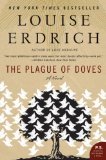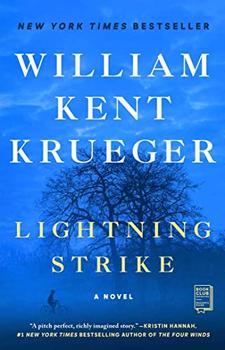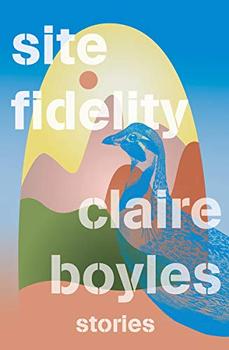Summary | Excerpt | Reviews | Beyond the book | Read-Alikes | Genres & Themes | Author Bio

A Novel
by Louise ErdrichThe jacket narrative of The Plague of Doves is rather
deceptive. Erdrich's latest offering isn't really a novel;
it's a collection of short stories loosely tied together
through the lynching mentioned in the book's description.
The core story serves as a touchstone, a place to connect
the diverse tales, but doesn't play a central part in the
characters' actions or development. Very little of the book
is about the brutal murders related in the book's one-page
introduction, focusing instead on relationships within and
between families.
Short story collections often suffer from unevenness in
quality from tale to tale. Such is not the case with The
Plague of Doves. All of the stories in this compilation
are engaging and exceptionally well-written, with a depth
rarely found in full-length novels, let alone the
abbreviated format of the short story. Erdrich is a master
story-teller. One of her strengths is her ability to shift
narrative style from chapter to chapter, depending on the
scene, event or character at the core of each tale. At times
her writing is lyrical, at others unembellished narration.
Some parts of this book are laugh-out-loud funny; she imbues
others with a sense of loss that resonates so deeply with
the reader that the events portrayed are completely
unforgettable. She vividly describes not only the sights of
the plains, but its tastes and smells as well:
"The wind came off the dense-grassed slough, smelling like wet hair, and the hot ditch grass reached for it, butter yellow, its life concentrated in its fiber mat, each stalk so dry it gave off a puff of smoke when snapped. Grasshoppers sprang from each step, tripped off my arms, legs, eyebrows. There was a small pile of stones halfway up the hill. Someone had cleared that hillside once to make an orchard that had fallen into ruin and was now only twisted silver branches and split trunks. I sat there and continued to watch the sky as, out of nowhere, great solid-looking clouds built hot stacks and cotton cones."
However, some of the stories, particularly
those in the middle third of the book, just don't seem to
fit. The reader struggles to find a way to relate them to
the broader outline of what is purported to be the heart of
the novel. In some cases the connection to the lynching is
so tenuous that it's difficult to understand why the tale
was included, sometimes consisting of nothing more than one
sentence mentioning a vague relationship to someone who took
part in the lynching nearly 100 years prior. In others,
characters from previous chapters behave so completely
contrary to the way they were portrayed earlier that the
later story doesn't seem to be about the same person. The
insertion of these tales feels unsettling and contrived.
While entertaining, they do nothing to resolve the central
mystery of the murder and subsequent lynching.
As short story collections go, Plague of Doves is
superb. As a novel, its lack of cohesion leaves something to
be desired. If the reader approaches the narrative expecting
short stories, they will not be disappointed, as this is
easily one of the best compilations to be published in a
long time. If, however, the reader is looking for a
well-written novel, he or she may find it more satisfaction
in one of Erdrich's earlier plot-driven works such as The
Painted Drum or The Master Butcher's Singing Club.
![]() This review was originally published in The BookBrowse Review in June 2008, and has been updated for the
May 2009 edition.
Click here to go to this issue.
This review was originally published in The BookBrowse Review in June 2008, and has been updated for the
May 2009 edition.
Click here to go to this issue.

If you liked The Plague of Doves, try these:

by William Kent Krueger
Published 2022
The author of the instant New York Times bestseller This Tender Land returns with a powerful prequel to his acclaimed Cork O'Connor series - a book about fathers and sons, long-simmering conflicts in a small Minnesota town, and the events that echo through youth and shape our lives forever.

by Claire Boyles
Published 2021
Set in the western sagebrush steppe, Site Fidelity is a vivid, intimate, and deeply human exploration of life on the shifting terrain of our changing planet.
Your guide toexceptional books
BookBrowse seeks out and recommends the best in contemporary fiction and nonfiction—books that not only engage and entertain but also deepen our understanding of ourselves and the world around us.